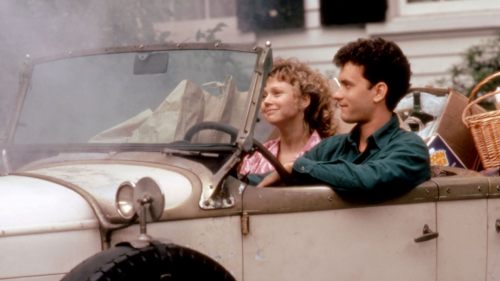TROOP BEVERLY HILLS, Still A Thrill
Troop Beverly Hills (1989) was the stuff of early nineties, female favored sleepovers. Right alongside fuchsia stained cotton comforters and Now and Later wrappers, beamed a tale about a woman and a group of girls learning to rough it… in Beverly Hills. Phyllis Nefler (Shelley Long), giving us Real Housewife realness before it entered the pop lexicon, was determined to lead a squad of young progeny to dictators, movie stars, and lawyers into wilderness capers with a feel-good message about teamwork, friendship, and beating the odds. The small crew whom I played kickball and traded SWV singles with devoured the decadence and sobering message so much so, that “Beverly Hills, what a thrill!” became a passive chant to kill time before the streetlights came on.
Positioned at the end of the 1980s, Troop Beverly Hills barely incited a ripple at the box office and some reviews were equally unkind. It camouflaged its way in the mire of cool, rich youth saturation during the time. Saved by The Bell was just months away off its high of Good Morning, Miss Bliss. Even the 1987 Saturday morning cartoon Beverly Hills Teens had a short, impressionable run (okay, just on me). The archetype rich kid could be found in almost any '80s teen movie you could get your hands on. Troop Beverly Hills was not unique and was essentially labeled just as uninspired as it was predictable.
Yet, Troop Beverly Hills sashayed its way into young folks’ hearts and grew a mild, cult following. The seemingly superficial popcorn fare always had a morsel of subversive intentions. If young girls are fragile to social notions of “fitting in,” Troop demonstrates a fictional band of peers that stayed true to themselves in spite of being on the receiving end of rugged mockery. And while there was plenty of wealth idolization, pending divorcee Phyllis was consistently proving she was more than designer wear and poolside galas.
Phyllis' marriage to Freddy (Coach’s Craig T. Nelson) has become nothing but quarrels and animosity. At a crossroads, Phyllis attempts to make strides to maintain a bond with her daughter. If she and Freddy can’t reconcile, she wants to selflessly play an active role in the interests of their child. Phyllis realizes the best way to do that is to remix Hannah’s crumbling Wilderness Girls division in Rodeo day spas and jewelry appraisal excursions.
Nefler’s Beverly Hills approach to wilderness girl life becomes a versus narrative between the more traditional wilderness girl image and Physllis' centralized fresh take. Troop Beverly Hills finds its conflict rooted in addressing class in an intriguingly textured manner. Pointing to a Reagan America where government programs were cut dramatically for the working class/poor while the rich received tax breaks, who better to symbolically combat this inequity than quintessential rival troop, the Red Feathers? Initially presented as the moral standard for wildness ethos and pride, the Red Feathers complicate the salt-of-the-earth, working class as the film’s antagonists.
The revered Red Feathers troop leader, Velda Plendor (Betty Thomas) will have none of Nefler’s opulent shenanigans. The acerbic tyrant, so stony she won’t even let her own daughter freely call her ‘mom’ lays the hammer down on tradition, something Phyllis poses a threat to. Velda resents her take on “roughing it,” and constantly belittles her authority in front of her troop. Velda’s hostility towards Nefler suggests a broader concern about the corruption that wealth conjures. If money can turn wholesome Christians into drug and sex addicts, while the “greed is good” rhetoric offers a road paved with fraud and jail time, what lies ahead for the Wilderness Girls of America with a troop leader decked in Theadora Van Runkle from a 90210 zip code? Ironically, Velda’s own corruptive attitude, in a fateful turn, makes her the very thing she feared would poison the infrastructure.
She and her Red Feathers use espionage, deception, and downright thuggery to make it impossible for Nefler and her troop to succeed. Manipulating trails to take them off the right path and selling cookies in their neighborhood to win sales numbers are both designed to be psychologically defeating tactics. But the Beverly Hills gang comes through with one grand fashion clapback. Lead by Tasha Smith’s Jasmine in a Tina Turner wig belting vocals for an original “Cookie Time” jam at a creative fundraiser to mend the Red Feather’s damage is a testimony that the only way to survive the wilderness was to creatively invent their own way of adapting. Velda’s controlling tantrums aren't fruitful because they are rooted in personal gain and greed.
In the end, it's the troop’s persistence and support of each other, even in moments of doubt, that carries them to a win at the climatic Wilderness Jamboree competition. Phyllis nurtured coming-of-ager’s collectively struggle with low self-esteem, and together they find confidence and independence from room service. They show each other that money doesn’t make you valuable and putting yourself before others is always at the heart of what it means to be a wilderness girl. Not stinking patches nor winning competitions.
Based on the real experiences of writer/producer Ava Ostern Fries, Troop Beverly Hills thoughtfully exposes the complexities of divorce, social/class culture and personal growth in a light comedy very much loyal to its time. The film tampers with audience expectations of people with money, blurring the lines of good/bad, rich/not rich. Troop Beverly Hills dared to tell young girls (and women) to never compromise the best of yourself for people or things. My sleepover experiences were fueled by this message, and Troop was our blueprint. Even with its blemishes, Troop Beverly Hills’ heart was always in the right place. What a thrill.


